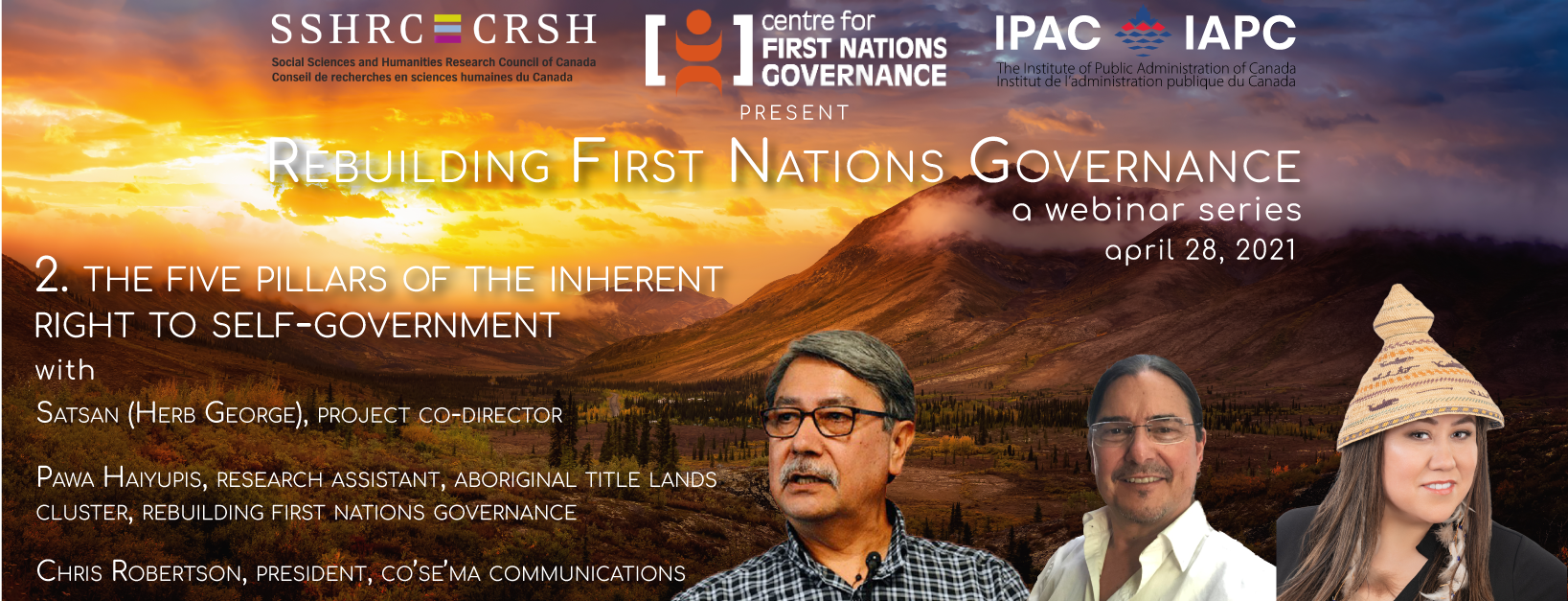Notice:
This event occurs in the past.
Webinar: The 5 Pillars of the Inherent Right to Self-Government
Wednesday, April 28, 2021 from 12:00 pm to 1:00 pm
- In-person event
What makes an effective self-governing First Nation and what does it take to get there? Let the team from the Centre for First Nations Governance walk you through the five pillars and seven principles for effective self-governance: people, land, laws and jurisdiction, governing systems & resources. This made-for-Canada model was developed through extensive consultations with First Nations citizens, leaders, elders, academics and on-the-ground facilitators associated with the Centre. Satsan, Chris Robertson, and Pawa Haiyupis will explain the framework as well as share their experiences working with communities to transition from Indian Act administration to self-government.
Effective self-governance is critical to the survival, health and well-being of First Nations people. It is a central pillar in reconciliation and in the creation of a new nation-to-nation relationship with the Crown. It is crucial to the long-term governance of Canada.
Join us April 28, 2021 at noon ET for the second in our series of five one-hour webinars in 2021 exploring the themes behind Rebuilding First Nations Governance (RFNG) – a First Nations community-led, multi-partner, SSHRC-funded research project to find pathways out of the Indian Act and into exercising the inherent right of First Nations to self-government.
This series will be of primary interest to First Nations leaders, administrators, and citizens who want to learn about their inherent rights; how the Indian Act obstructs their ability to develop effective self-governance and take their rightful place as citizens within their own nations and within Canada; and the power that First Nations’citizens have to transform the way their nation is governed.
These webinars will also be of interest to other levels of government and all those interested in learning more about the systemic issues behind present day challenges in Crown-First Nations relationships and are willing to explore and support alternatives for true reconciliation.

Panelists:
Satsan (Herb George), Project Co-Director
“Satsan (Herb George) is one of the Wet’suwet’en Hereditary Chiefs of the Frog Clan and a long-time Speaker for the Wet’suwet’en Nation. He has over 40 years of experience working towards recognition and respect for the inherent right to self-government in the courts, classrooms, and communities. Early in his career, Satsan was a key figure and strategist in the Delgamuukw-Gisdayway decision which ruled, for the first time, that Aboriginal Title and rights exist in law and are recognized and protected under section 35. Following the decision, Satsan went on to serve two terms as elected regional chief, representing BC at the Assembly of First Nations. He has lent his expertise to build educational programming around Aboriginal and Treaty rights and the inherent right to self-government in universities across Canada. In 2005, Satsan founded and became President of the National Centre for First Nations Governance (now the Centre for First Nations Governance). Today, Satsan is leading a collaboration between the Centre (where he continues to serve as Senior Associate), the Institute of Public Administration of Canada (IPAC) and Carleton University’s School of Public Policy and Administration – the Transitional Governance Program. The Project provides strategic direction and directs applied research and analysis to support First Nations governments who are working to leave behind Indian Act administration.”
Pawa Haiyupis, Research Assistant, Aboriginal Title Lands Cluster, Rebuilding First Nations Governance
“pawatsq?aciil (Pawa) is ahousaht, tla-o-qui-aht, French and Scottish. She is a graduate student in Indigenous Nationhood at the University of Victoria and holds an undergraduate degree in First Nations Studies from Vancouver Island University. For 21 years, she facilitated transformational gatherings in First Nations communities by providing meaningful engagement in decolonial systems change initiatives by encouraging connections to traditional waterways, lands, languages, songs and ceremonies. Pawa hosts safe spaces to explore difficult governance questions to put back in place everything colonialism disrupted. Her approach is rooted in the belief that nation
rebuilding is healing and is most effective when more people participate.
Pawa is skilled at the Art of Hosting, a collaborative approach to process design, group facilitation, training and capacity building. The facilitation draws on various processes, like Open Space Technology and Tribal Cafés. She adjusts what she offers to meet each group’s unique needs and challenges with weaving traditional Indigenous teachings and modern systems thinking tools.”
Chris Robertson, President, Co’Se’Ma Communications
“Chris is the President of Co’Se’Ma Communications, an established and respected consulting practice based in Gibsons Landing on the Sunshine Coast. He has over 20 years of experience specializing in business and community economic development, professional management, strategic planning and communications, organizational governance and most particularly; transitional self-governance and lands and resources support with First Nation communities, their governments and businesses.
Chris, of Gitxsan ancestry, currently provides advisory and facilitation work to a number of First Nations transitioning their Indian Act Administration to their citizen- defined and constitutionally protected self-government and jurisdiction over their territories. He is an experienced business negotiator and executive administrator with specialized training in a variety of facilitation techniques including those complementary to the traditional consensus building philosophies of First Nations.
Chris served an 11 year term as the BC representative on the Executive of the Board of Directors for the Aboriginal Peoples Television Network (APTN). He is also a personal volunteer and mentor to a number of individuals seeking guidance in entrepreneurial consulting and non profit organizational governance.”
REGISTER HERE: https://www.ipac.ca/iCore/Events/Event_Display.aspx?EventKey=WEB21RFNG2&WebsiteKey=858816d3-b17f-4d39-b926-f499484db52c